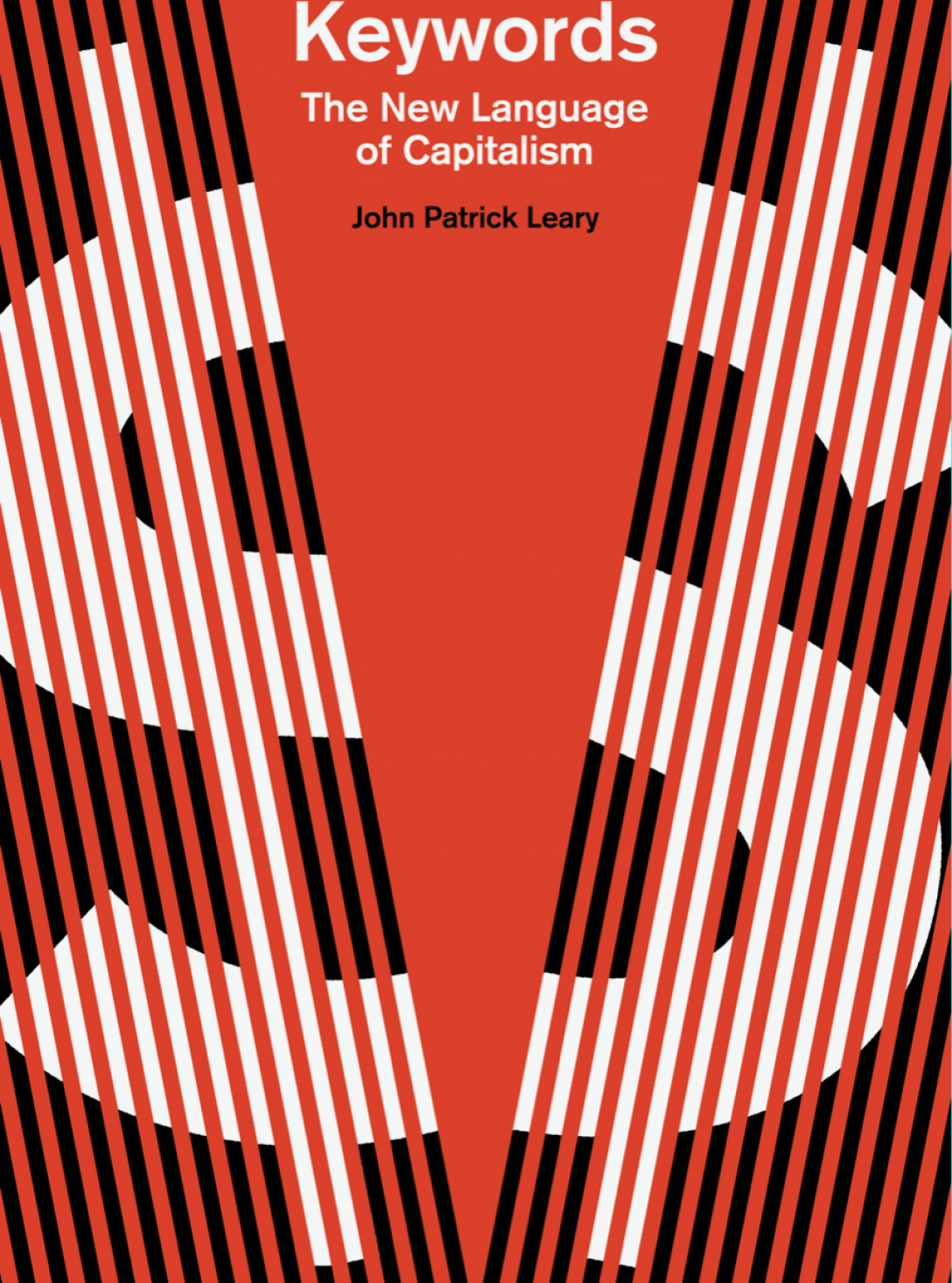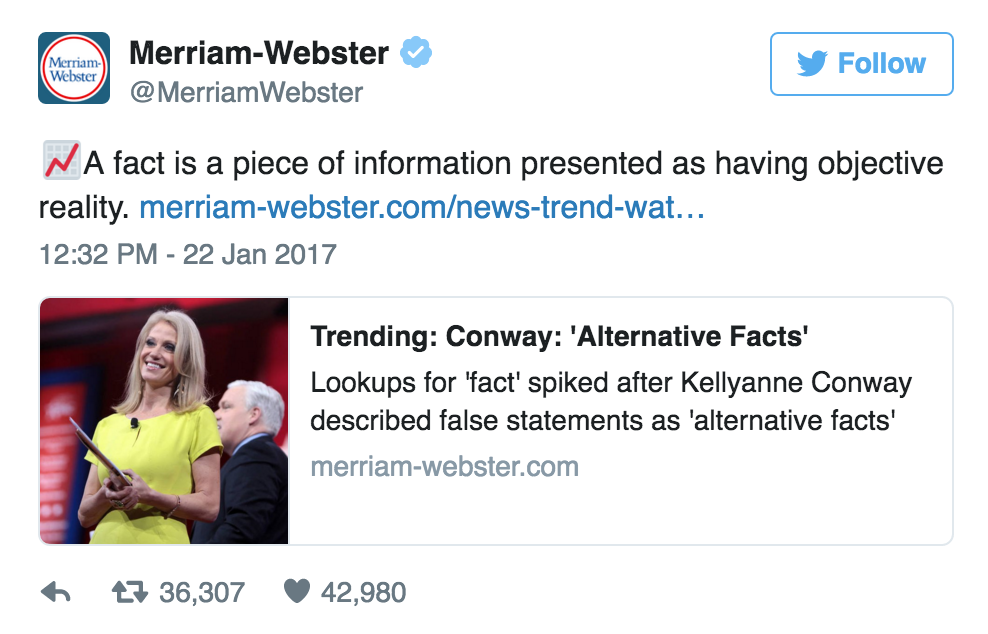Don’t be so overly dramatic about it, Chuck. You’re saying it’s a falsehood…Sean Spicer, our press secretary, gave alternative facts to that.
–Kellyanne Conway, Meet the Press, January 22, 2017
What, then, remains to be argued? Is it that slavery is not divine; that God did not establish it; that our doctors of divinity are mistaken? …Who can reason on such a proposition? They that can, may; I cannot. The time for such argument is past.
–Frederick Douglass, “What to the Slave is the Fourth of July?”
Yesterday on Meet the Press, Kellyanne Conway invoked “alternative facts” in defense of a Trump spokesman’s plainly false and easily disproved claim that the President’s inauguration was the largest in history. Meanwhile, the “alt-right” enjoys its triumphs in the wake of the Inauguration of a bigoted oligarch friendly to their core passions: white nationalism, hostility to immigrants, and unbridled capitalism. “Alternative” is having a little moment.
📈A fact is a piece of information presented as having objective reality. https://t.co/gCKRZZm23c
— Merriam-Webster (@MerriamWebster) January 22, 2017
The “alt” abbreviation might have its origins in the Internet culture of the late 1980s, when “alt.” was used by members of usenet forums to group enthusiasts of marginal subcultures into discussion forums–a medium which was itself a marginal subculture. Like “alternative” in general, “alt.” quickly became a brand, as terms like alt-country (sometimes spelled alt.country) and alt-metal proliferated, first as insurgent challenges to a mainstream style, and then a mere version of the same. And thus “alt.,” once rebellious and weird, became defanged and innocuous. It could also be a euphemism: terms like “alt-ac” (alt-academic) have remade scholarly unemployment into just another opportunity.
By the time I was a teenager in the 1990s, “alternative” was a fully dirty word, a corporate brand for popular music that hid behind certain emblems of rebellion (Doc Martens, flannels, etc). “Alternative” was particularly distasteful because it was fake—the unpredictable militancy of punk churned into the branded posturing of “alternative.”
The far right’s current investment in “alternative” is partly euphemistic, partly a brand name, and partly an appropriation of another successful style. First coined by Richard Spencer, the now well-known racist intellectual,“alt-right” is a euphemism and a successful brand name for white nationalism. The term also appropriates multiculturalist identity politics by setting up “white” as simply an alternative embattled racial identity, entitled to the same privileges and rights to separation that, he claims, now belong only to “minority” groups. In an article published by Spencer’s Radix journal, he and another white-supremacist, F. Roger Devlin, summed up the alt-right’s views on race by first disavowing racial supremacy. (Or so they claim: they concede that Africans may, in fact, be great sprinters.) Devlin and Spenser go on, citing as empirical “fact” an evolutionary preference for racial separation:
It it is almost exclusively White people who are being asked today not to prefer their own race to others. Blacks, Mexicans, Jews, and others are allowed—indeed, encouraged—to form exclusive organizations and pursue their particular interests. Only Whites are denounced as “racist” if they do this.
Alternative on the far right is meant to suggest “tolerance,” a moral and political relativism that the right in other contexts would denounce. There is no alternative, Margaret Thatcher famously said, insisting on a singular, universal history and future. In embracing the rhetoric of endless alternatives, the alt-right says, in effect, It’s just my opinion, don’t I have a right to it? My race isn’t superior to yours, it’s just fundamentally different. It’s important that the “alt-right” defines itself negatively (as an alternative to something), thereby evading any solid ground and shifting their position depending on the circumstance.
Spenser has elsewhere described his politics as “white identity politics.” This is what’s “alt” about the “alt-right,” Christopher Caldwell wrote in the New York Times: its appropriation of a relativist multiculturalism vocabulary for an agonistic politics of racism. But treating the alt-right as the novelty they claim to be overlooks the fact that “alternative,” as it has since the 1990s, remains fundamentally a bullshit term. “Alternative,” from the alt-right to “alternative facts,” is a mass-market rebranding of an older, somewhat more marginal bigotry. So the use of “alternative” aims to populate the flabby middle ground of liberal political discourse with enough doubt and noise to obscure and deflect the very deliberate militancy of the far right.
So, on to “alternative facts,” the dishonesty of which is obvious. Conway’s chiding of Chuck Todd on Meet the Press—“don’t be so dramatic, Chuck”—was an attempt to occupy the space of anodyne reasonableness that Spenser and his “National Policy Institute” also strive for. This has been also been a rhetorical space held down as well as anyone by Meet the Press itself, with its “on the one hand, on the other” style of inside-the-Beltway equivalence. On the one hand, says Conway, the crowds in 2009 were large. Others insist they were larger. Who can ultimately say?
Obviously, the answer has to be “any honest person.” But this is unfortunately besides the point. Like Spenser, Conway and her boss are militants who see politics as a battle, and who use “dialogue”and facts only for rhetorical effect—hence Trump’s radical-sounding inaugural address, which was devoid of the usual platitudes about national unity and cooperation. Conway, like Spenser, counts shrewdly on the openings that a liberal political sphere, generally hostile to open conflict, leaves open. The phrase “alternative facts” may be stupid, and it may be clumsy, but it may also accomplish its desired effect, which is discrediting the news media as a partisan institution it purports to be–and therefore discrediting from the beginning any criticisms it might make of Trump. As Masha Gessen wrote recently in the New York Times, “arguing about facts is, in fact, the ultimate distraction.”
As Merriam-Webster points out, there are no alternatives to facts that aren’t lies: facts are supposed to be the solid ground, upon which no dishonest “alternative” can rest. “Alternative,” the way the right uses it, is intended to broaden the space of acceptable politics by insisting that no politics, or facts, are condemnable. Spenser’s essays are peppered with endless statistics about Black criminality: for the reasons Douglass says above, it’s insulting to argue with them. It’s also fruitless to argue with Trumpism’s “alternative facts” (not that one shouldn’t try): the crowd at Obama’s inauguration was obviously larger, the sky plainly bluer. But Trump and his people clearly understand that the only fact that practically matters is who is winning.
Alternative facts can’t be debated; they can only be defeated. To put it another, blunter way: you can either debate Richard Spenser’s alternative facts, or you can do the following. Only one of these options can silence him.
This Is How We Do It feat. DJ Richard Spencer. pic.twitter.com/y4qxmOg7Dq
— Mehreen Kasana (@mehreenkasana) January 21, 2017


[…] * Keywords for the Age of Austerity: Alternative. […]
LikeLike